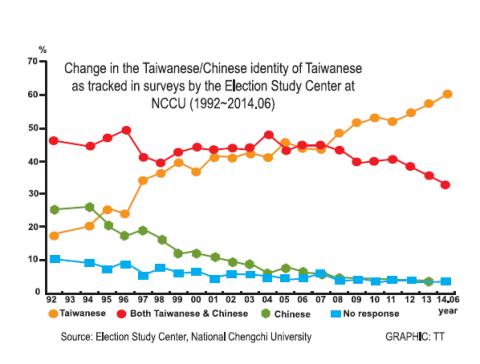A poll by National Chengchi University’s Election Study Center showed that a record-high 23.8 percent of respondents support Taiwanese independence, while a record-low 32.7 percent regard themselves as both Chinese and Taiwanese.
Meanwhile, 60.4 percent said they are Taiwanese, according to the poll, released on Wednesday.
The data were collected from three separate polls titled “Taiwan Independence versus Unification with the Mainland Trend Distribution in Taiwan,” “Taiwanese/Chinese Identification Trend Distribution in Taiwan” and “Preferences Trend Distribution in Taiwan.”

The data showed that the percentage of people who regard themselves as Taiwanese is the highest since June 1992, and those identifying themselves as solely Chinese dropped to 3.5 percent.
The number of Taiwan independence supporters and those inclined toward an immediate declaration of independence was the highest since December 1994.
Support for the Chinese Nationalist Party (KMT) reached a new low at 23.5 percent, compared with the Democratic Progressive Party’s (DPP) 25.6 percent, the poll showed.
Most respondents who had once supported the KMT had taken a neutral stance and did not now support the DPP, the data showed.
Earlier this month, President Ma Ying-jeou (馬英九) criticized the Taiwan independence clause in the DPP’s party charter, saying it is neither possible nor necessary to pursue independence because the Republic of China has been a sovereign state since it was established in 1912.
Fu Jen Catholic University assistant professor Chou Wei-hang (周偉航) in a recent article posted on his blog claimed Ma has come to promote independence.
The Ma administration’s cross-strait policies attempting to draw Taiwanese away from ideas of independence and toward eventual unification with China have instead driven Taiwanese further from Beijing, Chou wrote in an article dated Saturday last week.
Chou’s article also said that some of the more neutral cross-strait policies were affected by Ma’s incompetence, adding that successful policies in Ma’s terms — including increasing the number of countries allowing Taiwanese access to visa waiver programs or visas upon arrival — emphasized the difference between Taiwan and China.
No matter how much Ma would detest it, his “place in history” will be as a promoter of Taiwanese independence, Chou’s article said.

MAKING WAVES: China’s maritime militia could become a nontraditional threat in war, clogging up shipping lanes to prevent US or Japanese intervention, a report said About 1,900 Chinese ships flying flags of convenience and fishing vessels that participated in China’s military exercises around Taiwan last month and in January last year have been listed for monitoring, Coast Guard Administration (CGA) Deputy Director-General Hsieh Ching-chin (謝慶欽) said yesterday. Following amendments to the Commercial Port Act (商港法) and the Law of Ships (船舶法) last month, the CGA can designate possible berthing areas or deny ports of call for vessels suspected of loitering around areas where undersea cables can be accessed, Oceans Affairs Council Minister Kuan Bi-ling (管碧玲) said. The list of suspected ships, originally 300, had risen to about

DAREDEVIL: Honnold said it had always been a dream of his to climb Taipei 101, while a Netflix producer said the skyscraper was ‘a real icon of this country’ US climber Alex Honnold yesterday took on Taiwan’s tallest building, becoming the first person to scale Taipei 101 without a rope, harness or safety net. Hundreds of spectators gathered at the base of the 101-story skyscraper to watch Honnold, 40, embark on his daredevil feat, which was also broadcast live on Netflix. Dressed in a red T-shirt and yellow custom-made climbing shoes, Honnold swiftly moved up the southeast face of the glass and steel building. At one point, he stepped onto a platform midway up to wave down at fans and onlookers who were taking photos. People watching from inside

Japan’s strategic alliance with the US would collapse if Tokyo were to turn away from a conflict in Taiwan, Japanese Prime Minister Sanae Takaichi said yesterday, but distanced herself from previous comments that suggested a possible military response in such an event. Takaichi expressed her latest views on a nationally broadcast TV program late on Monday, where an opposition party leader criticized her for igniting tensions with China with the earlier remarks. Ties between Japan and China have sunk to the worst level in years after Takaichi said in November that a hypothetical Chinese attack on Taiwan could bring about a Japanese

The WHO ignored early COVID-19 warnings from Taiwan, US Deputy Secretary of Health and Human Services Jim O’Neill said on Friday, as part of justification for Washington withdrawing from the global health body. US Secretary of State Marco Rubio on Thursday said that the US was pulling out of the UN agency, as it failed to fulfill its responsibilities during the COVID-19 pandemic. The WHO “ignored early COVID warnings from Taiwan in 2019 by pretending Taiwan did not exist, O’Neill wrote on X on Friday, Taiwan time. “It ignored rigorous science and promoted lockdowns.” The US will “continue international coordination on infectious